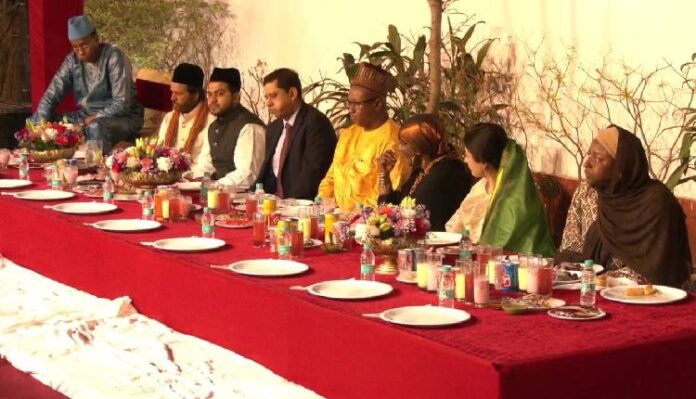The Indian Minorities Federation (IMF) hosted a ‘Sadbhavana Iftar’ at the residence of Rajya Sabha MP and IMF Convener Satnam Singh Sandhu in New Delhi, bringing together ambassadors from 19 Muslim-majority nations to celebrate the spirit of Ramadan. The gathering underscored India’s long-standing ties with the Islamic world, with diplomats praising Prime Minister Narendra Modi for fostering strategic, economic, and cultural partnerships with Muslim-majority countries.
Diplomatic Presence and Messages of Peace
The event saw the participation of ambassadors and diplomats from Somalia, Morocco, Afghanistan, Syria, Gambia, Mali, Bangladesh, Sudan, Djibouti, Algeria, Malawi, Cameroon, Chad, Guinea, Iraq, Cote d’Ivoire, Tanzania, Nigeria, Iran, and the UAE. Prominent Islamic scholars, religious leaders, intellectuals, and social reformers also attended, including Majid Alnekhailawi, Maulana Syed Kalbe Rushaid Rizvi, Haji Syed Salman Chishty, and IMF co-founder Himani Sood.
Before breaking their fast, attendees offered prayers for peace, harmony, and prosperity in India and across the world.
Ambassadors Highlight India’s Strong Ties with the Islamic World
Diplomats highlighted India’s growing influence in the Gulf, South Asia, Central Asia, and the Middle East, particularly in economic and security cooperation.
“India’s engagement with the Gulf region, which supplies over 60% of its crude oil, and the Organisation of Islamic Cooperation (OIC) nations, with which bilateral trade exceeds USD 200 billion, has become more robust and multifaceted under PM Modi’s leadership in the past 10 years,” they stated.
They also acknowledged India’s diplomatic presence on the global stage, with PM Modi receiving the highest civilian honors from several Muslim-majority countries.
India’s Role in Promoting Peace in Muslim Nations
Ambassadors emphasized India’s consistent support for peace and stability in conflicts involving Muslim nations:
“India has long positioned itself as a strong advocate for peace, stability, and dialogue in global conflicts involving the Muslim world, from Palestine to Afghanistan.”
They highlighted India’s support for a two-state solution in Palestine and its humanitarian aid to Gaza. They also commended India’s constructive role in Afghanistan, saying:
“India has played a constructive role by investing in critical infrastructure, education, and healthcare to improve the lives of the Afghan people.”
India’s Inclusive Ethos & Minority Welfare
Hosting the Iftar, Rajya Sabha MP Satnam Singh Sandhu underscored India’s tradition of coexistence and inclusivity, stating:
“Ramadan is not just a religious observance; it is a time for reflection, generosity, and community bonding—a sentiment that India deeply values and upholds. Prime Minister Narendra Modi has further strengthened this spirit of oneness and brotherhood amongst Indians over the past decade through his ‘Sabka Saath, Sabka Vikas’ mantra, reflecting India’s inclusive ethos.”
A representative from Iraq also acknowledged India’s commitment to inclusive development, saying:
“India is a multi-cultural, multi-religion and multi-community nation, but under the leadership of PM Modi, the whole country is united to work for one cause—Viksit Bharat. The minority communities have been looked after with care and affection in India.”
India’s Growing Role in the Global South
Sudan’s Education Counsellor, Mohamed Ali Fazari, praised India’s leadership in supporting developing nations:
“India is championing the cause of the Global South along with other developing and developed countries. India is a leading country in the world in terms of helping many other nations. The relationship between India and African nations has strengthened over the years.”
India as a Hub for Technology & Innovation
Zimbabwe’s Minister Plenipotentiary, Edson Moyo, highlighted India’s technological advancements:
“India and Zimbabwe share strong bilateral ties. India has always stood by Zimbabwe. We have focused on economic diplomacy and continued to move together. Artificial intelligence is one new area where India is moving forward rapidly. We have a lot to learn from India’s IT sector. We are also working to introduce a UPI-like payment system in our country.”
Gambia’s Praise for PM Modi’s Global Leadership
Gambia’s High Commissioner, Mustapha Jawara, credited PM Modi for his leadership in the Global South and global peace efforts:
“During Covid, India donated vaccines to Gambia, saving many lives. We are grateful to PM Modi for that. He is the leader of the Global South. I will say that PM Modi is the best of the best. It’s because of him that Africa has a representation in the G20. He is championing our rights at all levels, and we have nothing but to thank him.”
Iran Highlights Cultural & Historical Ties with India
Iran’s Cultural Counsellor, Fariduddin Faridasr, spoke about India-Iran relations:
“What is common between India and Iran is that both Prime Ministers are connected to their soil, rooted in their culture, heritage, and values. Supremacy of law is the soul of secularism, and India has that unique power, which is one of the many reasons it will continue to progress.”
Conclusion
The Sadbhavana Iftar reinforced India’s commitment to peace, inclusivity, and global partnerships. With growing diplomatic, economic, and cultural ties, India continues to strengthen its relations with Muslim-majority nations, while championing the cause of the Global South and promoting peaceful coexistence on the world stage.


